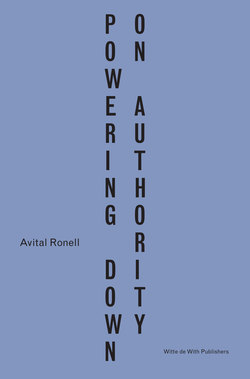Powering Down On Authority (English and Dutch)

Реклама. ООО «ЛитРес», ИНН: 7719571260.
Оглавление
Avital Ronell. Powering Down On Authority (English and Dutch)
Отрывок из книги
POWERING DOWN ON AUTHORITY
Avital Ronell
.....
Family and State obey distinct hierarchies of authority to which they are deemed answerable. They belong to different transversals of time, the overlaps of which Kojève deems largely illusory. Still, derivations and signals sent across the divide of regularly disbanding typologies are not uncommon. Father mixes in where he was evicted or merely tolerated, and memory traces of early identifications abound. Kojève uses the notion of authority as a brace against the wages of an inassimilable history, as something that could override the blanking out of representation (where only a neutral gleam can be detected), and a relation to disabled time (when things go into hiding or a lull, when one feels pressed but nothing moves, except for an ominous slo-mo tic-toc of finitude’s metronome). In a sense, we are asked to examine the haunting qualities of a history that cannot be integrated, qualities that resist being simply absorbed and quieted down. Still, one would have wanted Kojève to take a stab at Father Time, to articulate what brings time down upon us in terrifying ways, what makes the past recur and stand before us as the sign of what’s ahead, and so on and back and forth, with childhood crawling through the temporal cracks at moments of extreme vulnerability to said authority. One’s experience of time is not as linear as Kojève would have us imagine: when things make one tremble and one is regressed to voiceless episodes of despair, time flips and turns you into a child without the means to represent your anguish or push against the squeeze of severe proportions. Childhood is never simply behind us, but jumps ahead at times, startling us with its incessant returns and uncontrolled gag orders. Thus traditionally, the figuring of time has been paternalized. These nonlinear riptides of temporality are outside of Kojève’s domain, perhaps for good reason, given his materialist rap sheet, and understandably so if he wants to manifest an intention and a plan without formal or aprioristic or ontological weights. Anyone subjected to time, bound to the temporal destiny on which Hölderlin broke—his extreme experience of sudden endings that had him sitting speechlessly in Mr. Zimmer’s Tübingen tower—is scorched by a notion of “finitude” and left bedazzled by the conspiracy, or authority, of father and time. Let us simply establish a dossier for this area of speculative inquiry and wonder how Father Time tics and tocs to make his offspring lose out to the authority and dissolution of time, a no-doubt-generalizable fate given over to the persecutory invasiveness that Kojève seeks to contain. Hence it is the schedules under which one labors in excess of Kojève’s program—timetables of compensatory aggression, the itineraries of historical payback, the beat of totalitarian return, whether subtle or overt—that I hope to highlight. Let us bear in mind that poetry joins philosophy and theology in attaching the very possibility of time-flow to the paternal, to the godhead as father, or in divine eschatology.
Authority also turns Arendt toward the vacant lot of divine abandonment, where humankind is left to fend for itself in the draft of monotheistic withdrawal. The gods have fled and the one deity left for us has bailed or retreated into mute indifference. Somehow, authority (whether viewed as a form of liberal democracy or as one profile among several secular totalitarianisms) is summoned to fill in the blanks with an ontotheological arrangement of replacement parts. For both Arendt and Kojève, the distress of losing authority convenes core survival issues that need inventive arbitration as well as, in some essential ways, the recall to the philosophical of the question of the political, allowing the political to receive a fuller range of theoretical considerations.
.....